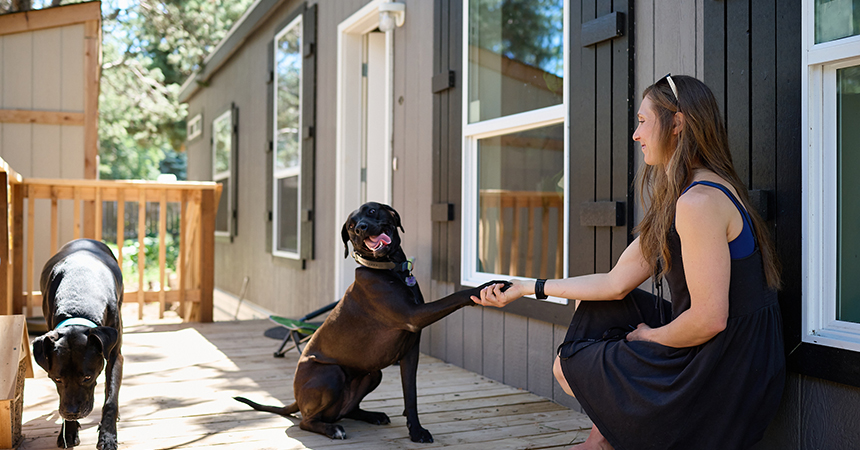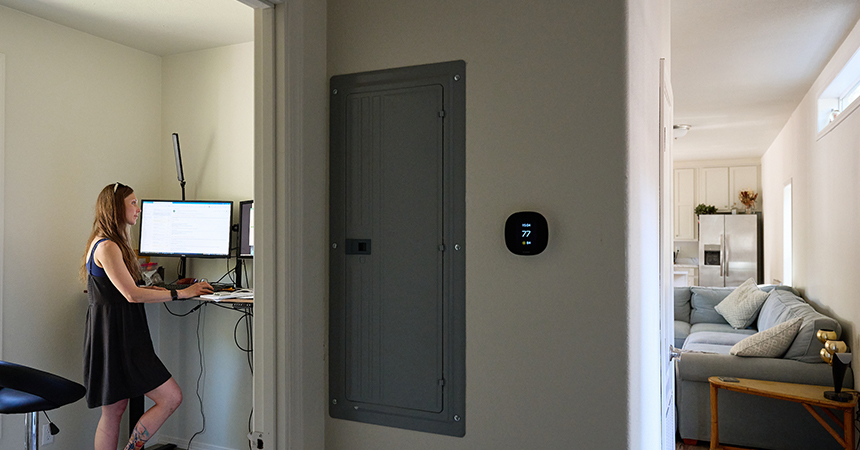
This spring, Nadja Schmidt moved into a new, energy-efficient manufactured home at the West-Side Pines Cooperative in Bend. The move was a milestone for her—and for Energy Trust.
Energy Trust’s manufactured home replacement program—offered in partnership with Oregon Housing and Community Service and the nonprofit lender Craft3—provides guidance and cash incentives to help people with low or moderate incomes replace outdated, energy-inefficient manufactured homes with energy-saving models.
Older manufactured homes may be drafty and uncomfortable due to poor insulation, but costly repairs can exceed their value. They can also rack up energy bills up to 70% higher than site-built homes.
On the other hand, new manufactured homes reduce energy costs, are more comfortable and offer a healthier living environment.
Schmidt’s home is the first owner-occupied project in a manufactured housing park to participate in Energy Trust’s home replacement program—meaning that she owns the home she lives in, rather than leasing it from the owner of a manufactured home park. Her project is emblematic of future needs as thousands of Oregon residents who own outdate, inefficient manufactured homes.
Schmidt first became interested in buying a new manufactured home back in 2019 after attending a presentation by Craft3, which makes loans to people who don’t fit the typical lending profile and may miss out on the wealth-building opportunities of homeownership.
She was intrigued but hesitant.
“I had just paid off my student loan and was not really wanting to take on another debt,” she said. “Also, I just hate moving.”
Schmidt contacted Craft3 a year later to learn more about the process and decided to proceed. Energy Trust, OHCS and Craft3 collaborated to create an affordable financing opportunity for Schmidt.
Schmidt was a good candidate for Craft3’s Manufactured Home Replacement Loan since she was supporting herself with two seasonal jobs: working for the forest service in the summer and fall and teaching snowboarding in the winter.
Seasonal workers may not qualify for traditional loans, but Craft3 looks at loans differently.
“We view people through an equity lens when we underwrite loans,” said Tawny Reader, Craft3 consumer product manager. “We are committed to providing people with opportunities to create financial stability and create wealth.”
OHCS helped finance Schmidt’s new home by providing gap funding in the form of a forgivable loan.
“Since this was a new program, we came up with creative ways to finance this project,” said Chelsea Catto, a manufactured housing senior program analyst at OHCS. “To make this work for Nadja, all the partners brainstormed and shared resources. It was very gratifying to see it come together.”
Schmidt knew investing in a new manufactured home would be life changing. Her old home was in bad shape—cold in the winters and in need of many repairs—but she loved her neighborhood because her mother also lives at the West-Side Pines and her grandmother lives nearby.
Schmidt purchased her new home from Clayton Homes in Albany, Oregon, a design/build company that specializes in sustainable and affordable homes. Models like Schmidt’s have energy-efficient thermostats, appliances and windows and use high quality insulation in the walls, floor and ceiling.
“I knew my quality of life would go way up when I made this decision,” Schmidt said. “A new, warm and energy-efficient place to live just sounded awesome.”

